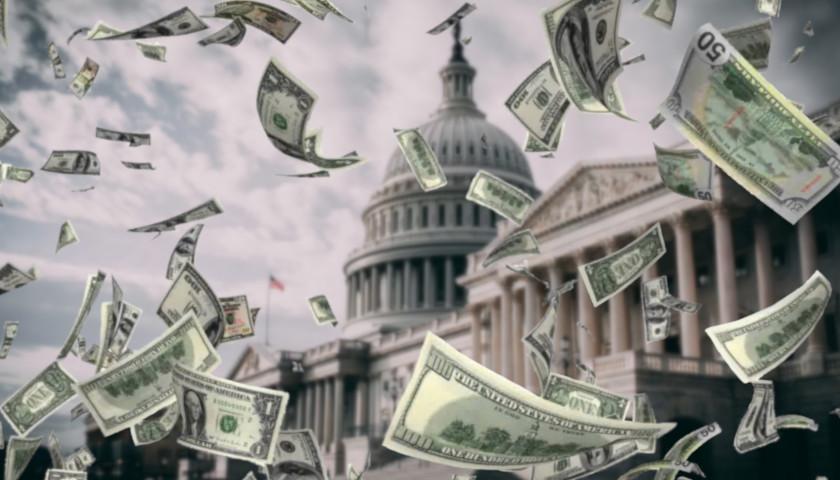by Edward Ring
The dollar’s status as the sole transaction and reserve currency of the world gives America’s federal government unique privileges. International demand for dollars enables federal budget deficits. It also creates an incentive for trade deficits, because incoming investments effectively collateralize American currency. To perpetuate this multi-decade debt binge, America’s real estate and corporate assets are for sale to any foreign investor with surplus dollars.
This is financial treason, because it is an unsustainable scheme that won’t end until there is nothing left in America that any foreigner wants to buy. The ultimate ramifications of this policy are all bad. Eventually, unchecked, they will be fatal. But like any addictive drug, the early stages of abuse are intoxicating. As Americans are systematically being deprived of their individual financial independence and their national sovereignty, they binge on imported consumer products sold at giveaway prices, heedless of the lost American jobs those products represent, or the fact that the dollars they’re exporting by purchasing these imports are used to finance hostile foreign militaries and purchase America’s most cherished national assets.
There are endless connections, and consequences, to the financialization of America as it might be described according to the following interrelated factors: Federal budget deficits require foreign demand for dollar denominated debt. Trade deficits create a surplus of dollars in foreign accounts available to purchase federal debt. Offshoring American jobs creates trade deficits and unemployment. Unrestricted immigration combined with environmentalist mandated scarcity causes inflation, which elevates the cost-of-living but slows the rate at which foreign investment eats up America’s assets. Government spending on entitlements mitigates unemployment and unaffordability caused by offshoring, unrestricted immigration, and environmentalist driven scarcity, but those entitlements cause even bigger federal budget deficits.
Got all that? Some of these connections are obvious, others far more subtle.
The Financial Hijacking of the American Dream
Ever since trade deficits got out of control starting in the 1990s, and especially since federal budget deficits got out of control starting in the 2000s, American economic policy has been to monetize the world with dollars to preserve demand for dollars. This explains one motivation for America’s de facto policy of unrestricted immigration from impoverished nations. Total remittances – not all of them can be tracked – from foreigners working in the United States to their families in their nations of origin are estimated to total around $100 billion per year. In small nations, dollars become an alternative currency, often considered more reliable than the local currency.
Unrestricted immigration also increases the global demand for dollars in a more subtle but more profound way insofar as the massive numbers of people arriving drive up demand for housing and durable goods, which increases the value of real estate and the value of stock in manufacturers of durable goods. The impact of 8 million people arriving since Biden took office in January 2021 is an unheralded but major cause of inflation over the past two years. And as the value of American assets explodes to levels unaffordable to the average American citizen, the value of collateral for the American dollar goes up. Foreign buyers still want that beach house in Malibu or that Pied-à-Terre overlooking Manhattan, but now they’re paying $20 million instead of $10 million. Thanks to asset inflation, balancing the current account just got twice as easy.
Policies deliberately calculated to inflate the value of American assets also help explain why environmentalist extremism is tolerated in America. The war against suburban “sprawl” may have support from many constituencies, ranging from environmentalists who oppose all growth to rural inhabitants who don’t want to see their bucolic county transformed into just another undifferentiated slurb. But there are hard economic motivations that underlie the institutionalization of environmentalist inspired de-growth policies. When supply is artificially constrained, prices go up. An entire coordinated series of restrictive policies ensure this happens.
For example, not only is development on raw land increasingly difficult, as open space “nonprofits,” backed by billionaires, continue to buy up the land surrounding America’s urban centers for “conservancies.” There are also building codes, now designed to require “net zero” homes, that drive up costs, at the same time as America’s domestic timber harvesting and milling industries, decimated by excessive regulations, have driven up the cost of lumber. Not just lumber, but all building materials are impacted by unreasonable environmentalist restrictions: aggregate, steel, along with construction equipment and the required fuel.
The results of this deliberate squeeze on the ability to develop affordable unsubsidized housing are clearly irrational. Dilapidated 900 square foot shacks in the mountains surrounding the Silicon Valley are selling for over $1 million, while regular homes on modest acreage can go for ten times that much. And small wonder. Santa Clara County, host to the Silicon Valley, has a population that is 40 percent foreign born, a total population that has tripled within the past 50 years, and the most extreme environmentalist building codes and restrictions in the nation. Chinese billionaires buy these homes with what for them is pocket change, as long-time residents move to adjacent states in hopes of staying ahead of the inflationary wave.
Replacing Economic Freedom with Government Dependency
Where there is unaffordable shelter, unaffordable utilities, unaffordable food, and ridiculously high taxes, in steps the government, ready to subsidize households that have lost any hope of ever achieving privately earned financial security. One might even argue that deficit spending by the government is justifiable, if it is used to make long-term investments to build enabling water and transportation infrastructure so cities can expand, the stock of single-family detached homes can increase, and home prices can come back down to earth. But that strategy belongs to a bygone era.
Today America’s federal and state budgets go broke and into the red in order to give to people the amenities they’re no longer asked to earn, or often are even capable of earning. Housing. College tuition. Food. Coupons to ride trains for free. At staggering cost, and like dominoes falling, Americans are being trained to forego hard work. Instead, they’re taught to exchange personal responsibility for collective dependence on the government. The impact on character is insidious, and as Americans by the millions are driven into wallowing indigence, more foreigners arrive to take the remaining jobs.
Connectivity abounds. If Americans demanded reasonable environmental regulations and domestic sourcing of raw materials and manufactured goods, it would break the cycle. Without foreign demand for dollars, the federal government would have to limit its spending to its revenue, which would take away its ability to keep millions of Americans dependent on hand-outs. In a virtuous cascade of impacts, the availability of raw materials and finished goods including housing would go down, because foreign buyers would no longer be bidding up prices and American companies and workers would be turned loose to compete to produce products and housing at affordable prices. Who loses?
Contemporary Globalism is Misanthropic
This is a loaded question, because there is a moral case for financializing America to fund the economic development of foreign nations. At the same time as we impoverish and erase our own people, loading them up with fentanyl and brainwashing them with bizarre race and gender ideologies and climate panic, we are creating jobs in developing countries. The upside, so the globalist argument goes, is that the economic harm we do to our own nation is more than offset by the economic benefit we stimulate in every other nation. This argument, for all its seductive value to neoliberals who parrot it without bothering to understand its nuances, falls short in ways that actually harm foreign nations.
For starters, while overall economic growth may be maximized when every nation exports those products that they produce most cost-effectively, the local impacts are not all benign. Nations that produce coffee at competitive global prices, for example, end up with valuable cropland converted from food production to coffee plantations. These coffee plantations are typically owned by multinational corporations that repatriate profits to low tax nations elsewhere, while buying off a small local elite that streamlines the regulatory environment. Meanwhile, the nation becomes dependent on imports for everything except coffee, and even the coffee ends up priced out of reach for the average citizen. Replace “coffee” with any specialty product and the “gains of trade” translate on the ground into nations with seething, destitute populations dependent on accumulating debt and foreign aid.
Such is the value of globalist pieties. Environmentalism. Neoliberal free trade. It enriches multinational corporations and international banks, oligarchs and autocrats, NGOs and nonprofits. It empowers supranational institutions, and is presented as the only enlightened course for nations in a shrinking world. But everyone else loses. All too often the more general impact of globalization is to disenfranchise the vast majority of ordinary citizens from the United States to Somalia by denying them a diverse economy that might bestow a robust job market and national self-sufficiency.
America is for sale, because selling America helps preserve our federal government’s unique ability to print as many dollars as it wishes without short-term consequences. This enables an American oligarchy to impose its economic vision on the world. But there are alternative visions for global development that do not adhere to an agenda of artificial scarcity, populations dependent on their government, and nations beholden to a single crop or commodity for their economic survival. We may hope America’s leaders again recognize the value of investments and policies that foster abundance instead of dependency, for foreign nations as well as for their own citizens. Adopting that strategy may require a tumultuous rebalancing, but the sooner it happens, the easier it will be.
– – –
Edward Ring is a contributor to American Greatness.






Sure glad to have someone speak to the problem I had identified 2-3 years ago. Greed will be the vice that destroys America. Just consider the Biden family influence peddling. Greed at the expense of America.
Very insightful.